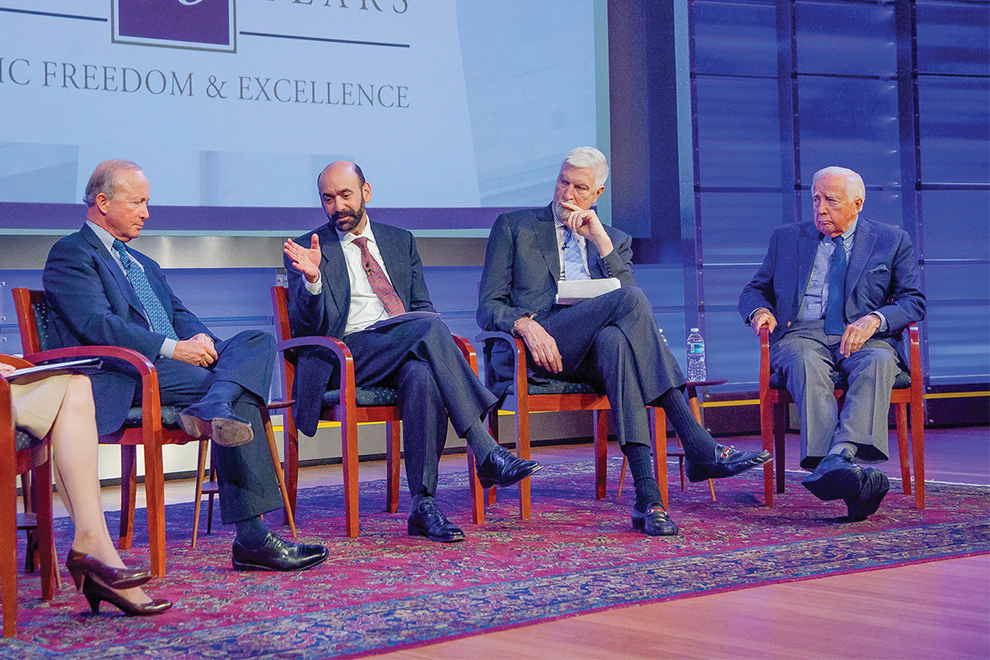As automation, globalization, and technological progress reshape the nature of our economy, little ultimately can be certain about the future of our workforce. One thing is clear, however: Today’s college graduates must be ready for that uncertainty. And colleges and universities are responsible for educating the future citizens and leaders of our country. Indeed, the American system is uniquely premised on the need for an informed citizenry. Today, colleges and universities are failing in this mission—even as tuition costs continue to soar.
We know this because employers routinely complain that college graduates lack the basic skills the workforce demands. One recent survey found that only 42% of employers think recent graduates are proficient in oral and written communication. As for civic knowledge, it is hard to imagine that American college graduates have ever known less about their country. Nationally, only 18% of U.S. colleges and universities require all students to take a foundational course in U.S. government or history. When ACTA commissioned the National Opinion Research Center to conduct a civics survey in 2019, the results were alarming. Fewer than two-thirds of college-educated Americans, for example, could identify the current chief justice of the U.S. Supreme Court—on a multiple-choice question!
ACTA believes that students need a strong foundation of skills and knowledge, which can only be achieved through clear general education requirements. Our What Will They Learn?® project shines a light on the core requirements at America’s institutions and makes the information easily available to college-bound students, parents, high school counselors, and higher education policymakers. And we work with colleges and universities to uphold high academic standards and promote a rigorous liberal arts program that prepares students for rewarding careers and meaningful community participation, and with an understanding of the rights and responsibilities of American citizenship.
“ACTA, like no other organization, is reaching out to trustees and alumni to insist on a quality liberal arts education that is fundamental to an educated citizenry.”
—David McCullough, Author & HistorianWhat We’re Doing
Diagnosing the Problem
The erosion of academic standards at American colleges and universities is the single greatest cause of weak student outcomes. For this reason, ACTA publishes a wide range of research to bring attention to the problem and to highlight best practices.
What Happened to the Core Curriculum?
Our What Will They Learn?® project annually evaluates the general education program at over 1,100 colleges and universities, public and private. A staggering 88% do not require intermediate-level foreign language study of their baccalaureate graduates, even though no tool better equips students to appreciate diversity and succeed in the global economy. Is it any wonder that our representative institutions are breaking down—along with civil discourse—when 82% of the nation’s colleges do not require a basic course in U.S. history or the country’s political institutions? And 97% of students can graduate without studying one of the most urgent topics of contemporary life—economics.
A Crisis in Civic Education
We have been studying and tracking the issue of civic illiteracy since our founding. ACTA’s 2016 report No U.S. History? examines the declining standards within history major programs: Only seven of the top 25 liberal arts colleges required history majors to take a course in U.S. history. In A Crisis in Civic Education, ACTA documents how the recent attempts at civic education disregard the need for substantive academic requirements and narrowly focus on civic projects and activities that have only deepened the crisis by sidestepping it. And in 2000, ACTA released its eye-opening report Losing America’s Memory, which revealed that 81% of seniors from the top 55 U.S. colleges and universities failed a high school level history exam and that none of the institutions surveyed required a course in American history.
A representative democracy only functions when the citizenry understands the country’s principles, political institutions, and history. Unfortunately, as America approaches the 250th anniversary of the signing of the Declaration of Independence, it is in urgent need of a civics education renaissance. That is why, in 2020, ACTA published 10 Things Everyone Should Know About American History, an essay by Dr. Allen Guelzo designed to reinvigorate public awareness about the role that universities, state legislatures, and boards of education should play to prepare students for a lifetime of informed citizenship.
Making a Difference
ACTA partners with trustees, faculty members, and college administrators to drive curricular change and raise academic standards—whether through revisions to a university’s general education requirements, advice on program prioritization, the adoption of general education assessment protocols, or the addition of a well-designed U.S. history requirement. We also provide policymakers with documented best practices, information on the performance of their state’s higher education system, and expert legislative testimony on a range of important issues.
Empowering Students and Parents
ACTA recently launched a new initiative to help students, parents, and K-12 educators understand the importance of shopping for college wisely—taking curriculum, cost, graduation rates, and campus climate into account. Through our completely redesigned WhatWillTheyLearn.com website, and outreach to high school counselors and principals, we are working to match serious students with serious academic programs.
Cultivating Academic Excellence
The Fund for Academic Renewal spotlights transformative philanthropy and advises donors through the process of making a major gift to a college or university. We not only work to ensure that the gift agreement protects the donor’s intent, we also match philanthropists with Oases of Excellence academic programs designed to foster teaching and research in the liberal arts and sciences, and to build a free and open marketplace of ideas on campus.
By empowering college and university stakeholders with the knowledge and tools to enact change, ACTA is leading an overdue reformation in American higher education. We all have a stake in the outcome. Universities that work diligently to prepare students for the 21st century labor market and to cultivate an informed citizenry are central to perpetuating free institutions and the economic prosperity we enjoy.
RELATED
INITIATIVES
Partner with us in restoring the promise of higher education.
SUPPORT
ACTA
Like what you see?
Help keep our resources current, free, and independent.
WHO WE ARE
Launched in 1995, we are the only organization that works with alumni, donors, trustees, and education leaders across the United States to support liberal arts education, uphold high academic standards, safeguard the free exchange of ideas on campus, and ensure that the next generation receives an intellectually rich, high-quality college education at an affordable price.
Discover MoreSTAY INFORMED
Sign up to receive updates on the most pressing issues facing our college campuses.




